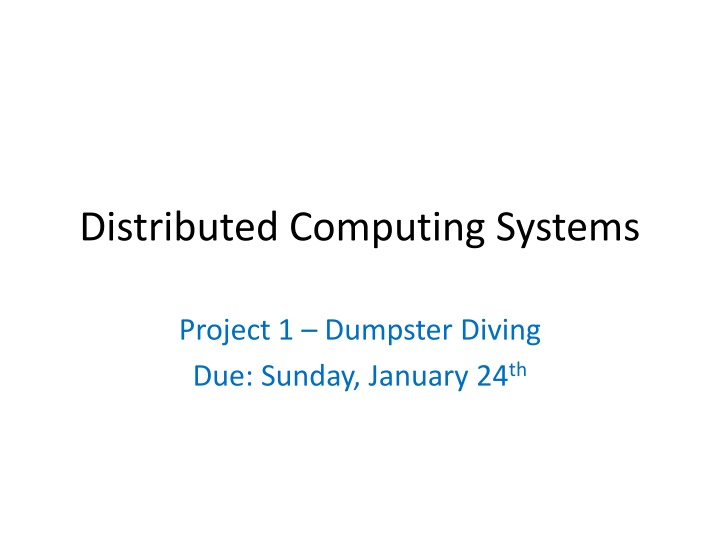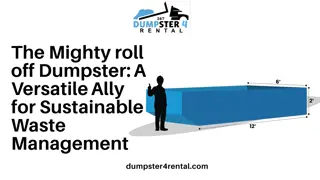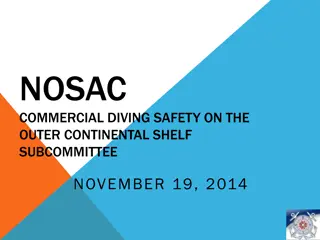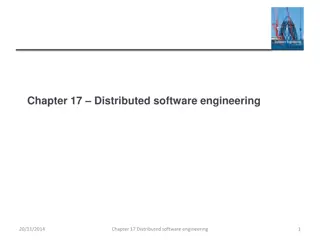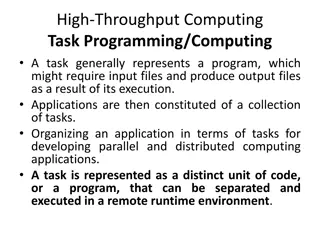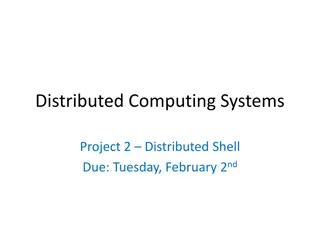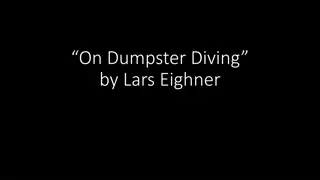Distributed Computing Systems Project: Dumpster Diving Overview
This project involves creating utilities to manage files in a dumpster, allowing users to restore deleted files and permanently remove unwanted files. The system includes functions for moving files to the dumpster, restoring them to the current directory, and cleaning out the dumpster. The project must be coded in C or C++ and work on Linux machines, specifically CCC machines. Using system calls like chmod, chown, link, unlink, and more will be essential for implementing the required functionalities. Hints and sample code are provided for guidance on parsing command line parameters, accessing environment variables, managing file permissions, and handling directory operations.
Download Presentation

Please find below an Image/Link to download the presentation.
The content on the website is provided AS IS for your information and personal use only. It may not be sold, licensed, or shared on other websites without obtaining consent from the author.If you encounter any issues during the download, it is possible that the publisher has removed the file from their server.
You are allowed to download the files provided on this website for personal or commercial use, subject to the condition that they are used lawfully. All files are the property of their respective owners.
The content on the website is provided AS IS for your information and personal use only. It may not be sold, licensed, or shared on other websites without obtaining consent from the author.
E N D
Presentation Transcript
Distributed Computing Systems Project 1 Dumpster Diving Due: Sunday, January 24th
Three Utilities rm Remove files to dumpster dv Dive to restore files that were removed dump Permanently remove files from dumpster
RM Transparently replace /bin/rm Actually, just earlier in users PATH Moves files to dumpster" directory Specified by user in DUMPSTER environment variable Use rename(), link(), unlink(), as appropriate Note, need to pay attention to partitions for file and dumpster Same name? Add extension .1, .2, .3 ... .9 If already .9? Then report dumpster full File permissions, including access times, should be preserved Use the stat(), chmod(), utime(), as appropriate Command line options: f : force complete remove, do not move to dumpster directory r : recurse directories (requires directory commands and traversal)
DV Restore deleted files from dumpster to current directory (not origin) Use getcwd() to get current working directory File permissions, including access times, should be preserved Feel free to support any command line options that you think are useful e.g., -a option restores all files with same name, and .1, .2, ... extension
DUMP Permanently remove files from dumpster directory Use unlink() and rmdir(), as appropriate Recursive, until whole dumpster is empty
Linux Must be coded in C or C++ Must work in Linux Specifically, CCC machines Development can be elsewhere, but must ensure works on CCC machines
Hints (1 of 6) See get-opt.c for help in parsing command line parameters See stat.c for sample code on how to get status (e.g., permissions) information See env.c for sample code on how to (more easily) access environment variables See ls.c for sample code on how to do a directory listing See touch.c for sample code on how to set modification times Other system calls that may be useful: chmod() - change (user, group, other) permissions chown() - change ownerships link() - add a hard link to a file unlink() - delete a file rmdir() - remove a directory remove() - delete a file or directory rename() - change the name or location of a file getcwd() - get current working directory for a process perror() - print appropriate text-based strings for system call errors access() - can be used to check for existance of a file basename() and dirname() - split full path to dir and filename (warning! can modify incoming string so copy first)
Hints (2 of 6) In general Proceed incrementally, write SMALL pieces of code first and then test When appropriate, place code in separate function to aid readability and testing e.g., int getExtension(const char *name) Do not worry about efficiency nor elegance initially e.g., static arrays vs. malloc() fine to start Refactor code as appropriate as proceed More than one way to do something e.g., checking partition can be done using the stat() call, looking at st_dev or by doing the rename() call, looking for EXDEV
Hints (3 of 6) Error check all system calls! Can fail for a variety of reasons Can use perror() to print appropriate text-based strings for system call errors Or strerror() Or errno Man pages indicate return values at end
Hints (4 of 6) Suggested development steps: 1. Setup program, take in 1+ arg (argv[1]) and DUMPSTER with getenv() 2. Move file in current working directory to DUMPSTER on same partition using rename() 3. Add check for same name using access(), adding extension .num 4. Add support for single file in another directory (e.g., /tmp), using dirname() and basename() 5. Check if file to be moved is on another partition using stat() with st_dev or EXDEV error set by rename() call 6. For files on another partition, write copy function to move across partitions, using link() and unlink() 7. Modify copy to preserve permissions using stat() and utime() 8. Check if file to be moved is a directory using stat() and S_ISDIR() 9. For directories on another partition, write function to iterate through directory using opendir() and readdir(), providing each file name for moving 10. Parse additional command line arguments (e.g., "-r") using getopt() 11. Modify code to recurse through sub-directories, as appropriate, moving all to DUMPSTER 12. Enable iterations through all filenames passed in 13. Error check many test cases thoroughly
Hints (5 of 6) Final flow of rm may look like: Parse command line arguments Check environment setup (for dumpster) For each file to be removed If file does not exist Report error If file is directory Create directory in dumpster For each file to be removed ... (recursive) If file is on another partition Copy file to dumpster If file is on same partition Link file to dumpster Unlink old file End for
Hints (6 of 6) Already installed on the Zoo lab Or, can install in user space anywhere http://www.cygwin.com/
Experiments Measure time to link()+unlink() or rename() Small operation so repeat and divide Measure throughput (bytes/sec) for copy Large file Use sync() to be sure flushed and not in RAM Put together have per-file cost and per-byte cost. Use to predict time to rm for large dir with many files Measure time for many files (large and small) and compare to predicted
Writeup Design - describe your experiments Programs/scripts (pseudo-code) Number of runs Data recording method System conditions Other Results - depict your results clearly Tables or graphs At least mean and standard deviation Analysis - interpret the results Describe what results mean How does your prediction match measured? If there is a difference, why do you think there is?
Hand In Source code package rm.c, dv.c, dump.c Support files (*.h) Makefile Experimental writeup tar and gzip See Web page for turn in instructions
Grading Support for all command line args Proper checking of DUMPSTER env Support for rename()of single files Support for copy and unlink() when needed Preserving permissions during copy and unlink() Support for directories Support for recursive directories Support for name collision with .num extension Proper working dump Proper working dv Experiments: Design (4 points) Results (3 points) Analysis (3 points) See rubric on Web page, too (10 points) (2 points) (5 points) (15 points) (5 points) (10 points) (5 points) (8 points) (15 points) (15 points)
